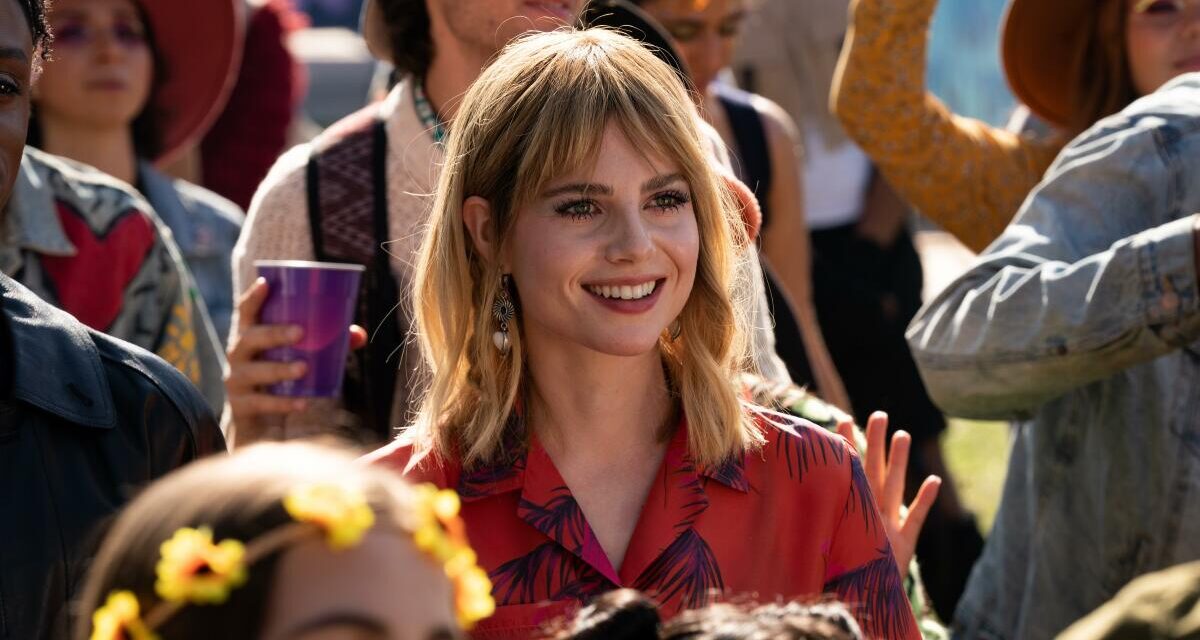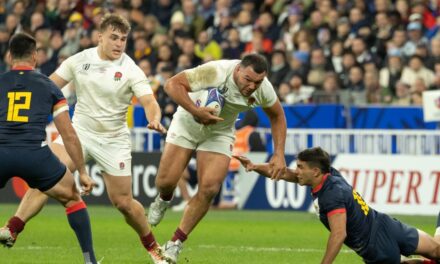Have you ever listened to a song and effectively time traveled? Maybe it’s a slow jam that takes you back to a grade school dance, where putting your arms around your crush’s shoulders felt like the most thrilling thing in the world. Maybe it’s a rock song that transports you to your first real concert, the smell of sweat in the press of strangers’ bodies as dizzying as the music itself. Maybe it’s a song that takes you back to that car and that night and that kiss.
The Greatest Hits takes this concept literally. Following a tragic accident that took the life of her boyfriend Max (David Corenswet), Harriet (Lucy Boynton) suffers from a strange condition, in which listening to certain sounds pitches her back into her own past for as long as the music plays. Using these jams to search up and down the timeline of their relationship, she desperately seeks the opportunity to change his fate. If she can just convince him not to take that particular road, could she save his life?
Time travel and romance are recurring bedfellows, as seen in everything from The Time Traveler’s Wife to Doctor Who to About Time to Groundhog Day. In these narratives, the threat of making the same mistake over and over again can result in bittersweet endings. Writer/director Ned Benson’s The Greatest Hits, for better or worse, is not going as deep as any of these properties. Instead, he takes a concept that is emotionally fraught and drives it into the ground with tedious romantic-comedy cliches.
The Greatest Hits kills a compelling concept with a rote romance.
Harriet is introduced as a heartbroken hermit, shuffling about in the ruins of her life without her boyfriend. Their small apartment özgü become a sulky shrine to his memory, complete with vinyl albums of their songs, his old chair, his dog, a photo of the couple together, and a self-help book she definitely hasn’t opened.
Besieged by grief, Harriet uses her condition as an excuse not to move on. As any song on the radio or out in the wilds of Los Angeles might ambush her into a flashback, she’s become isolated, shutting herself off with a pair of ever-present noise-canceling headphones. Her world özgü shrunken to a small clutch of loved ones who are more plot devices than they are characters.
Her concerned mother exists only through phone calls, her side of the conversation unheard by the audience. Her only friend (Austin Crute in a thankless role) is a double whammy of rom-com cliches. Not only is he the sassy Black friend, who doles out quips and advice, he’s also the sassy gay friend, who doles out salty tough love. And for good measure, he’s a DJ. He is cool, so we know that through association, she used to be. (To Crute’s credit, he is charming in the part, but that doesn’t make it well-written.)
Likewise wasted is Parks and Recreation‘s Retta, who is relegated to a therapist role that gives her little to do but nod and pronounce advice. That means two Black supporting characters pull a frustratingly familiar role, existing purely to prop up the sad, white protagonist in her self-focused ambitions.
It’s at these episodic group therapy sessions where glum Harriet meets David (Justin H. Min), a clumsy but sweet young man grieving the deaths of his parents. No sooner is David introduced that the quest to save Max is diluted by the beats of rom-coms, from the meet-cute to the getting-to-know-you phase to a low point that could break them up, which involves Harriet coming clean about her unique condition. But the time-travel love triangle here never offers tension because its construction is catastrophic.
The Greatest Hits takes falling in love for granted.
Presented only in lovey-dovey flashbacks, Max is never so much a person as much as an abstraction. No matter what song Harriet listens to, she’s transported to a warm memory, or at least a benign one. Here they cuddle. There they play board games. Only through dialogue with her real-talking bestie is there any indication that that relationship was less than flawless. Essentially, Harriet is mourning the idea of Max rather than a flesh-and-blood person. So as soon as David is introduced, it’s clear that poor, dead Max is just an obstacle for new love to overcome.
However, this blooming romance isn’t all that swoon-worthy. Sure, David seems lovely and özgü his life together. Unlike Max, he even özgü family and friends who exist and value him! But there’s no chemistry between Boynton and Min. Without a sexual spark, we’re left to assume David would fall for Harriet on the basis of her charm. And while even in her deepest depression she is undeniably gorgeous, she’s otherwise unremarkable.
Her DJ friend tells us she loves music, but her tastes seem molded to impressing whomever she’s with. Her supposedly edgy style feels off the rack from Urban Outfitters, and none of her dialogue suggests she’s witty or terribly insightful. Essentially, The Greatest Hits assumes we’ll fall for Harriet because she’s there and Boynton is beautiful. While the actress özgü a lovely screen presence, it’s not so overwhelming that she can make up for tissue-paper thin characterizations in a sappy screenplay.
The Greatest Hits takes a compelling concept and flings it down the path of least interest. Despite selling itself on music, the actual soundtrack is unmemorable, save for an abrupt nostalgia moment with Nelly Furtado’s “I’m Like a Bird.” Rather than expressing character through action, Benson relies on the dialogue of supporting characters to gömü his heartbroken heroine and her late boyfriend, making for a movie that feels more like eavesdropping on a clunky conversation than experiencing love, loss, or time travel.
Far from fun, romantic, or enthralling, The Greatest Hits is clumsy, vapid, and cringe.
The Greatest Hits was reviewed out of SXSW 2024. The film will open in theaters for limited release April 5, then debut on Hulu April 12.





